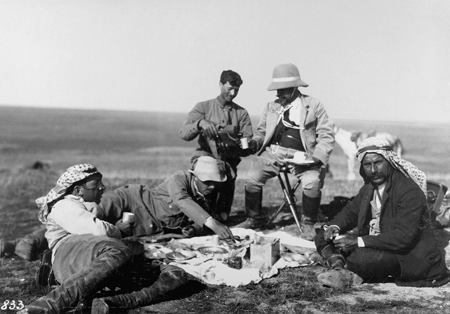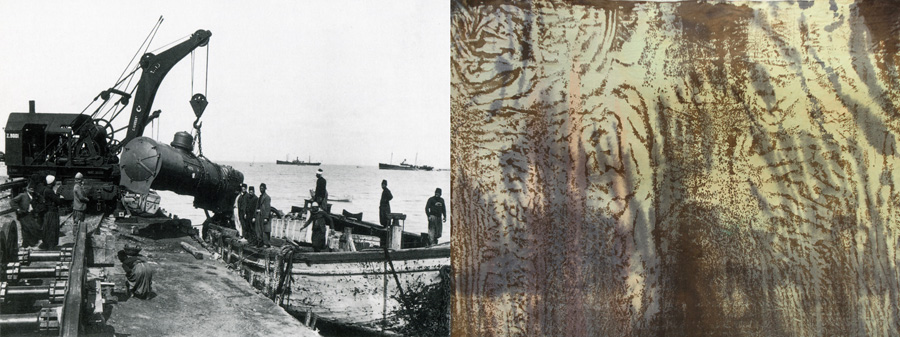Judith Raum – harmless entrepreneurs

© Max Freiherr von Oppenheim-Stiftung, Köln
*** German version below ***
Opening with lecture performance Friday, April 15, 2011, 7 .p.m.
Duration April 16 – June 10, 2011
Finissage with lecture performance June 10, 2011, 9. p.m.
The lecture will be held in English.
Since 2009, Judith Raum has engaged in artistic research dealing with the effects of German
financial imperialism on the cultural relations between the German and the Ottoman Empire
during the early 20th century.
For the opening of her solo-show at uqbar Judith Raum will use a lecture performance to follow a
few narrative threads from inside the topic area. She will describe ways in which the profitoriented
expansion of the German Reich into Anatolia functioned, and she will point to different
modes of production interconnecting with the expansion, and colliding with it to some extent. The
lecture performance will bring together carrier structures, narrators’ voices, archival material and
objects produced by the artist herself to form a provisional installation blurring factual
representation and fiction and remaining accessible throughout the duration of the exhibition.
In 1888, the Ottoman Empire commissioned a corporation founded by the Deutsche Bank and
German construction firms in order to construct the Anatolian Railway – a railway crossing
present-day Turkey, which was intended eventually to reach the oilfields around Baghdad.
The title of the exhibition harmless entrepreneurs refers to a statement by Georg von Siemens, chief
executive at Deutsche Bank during the initial years of the Baghdad Railway project. In a speech to
some of the bank’s shareholders, he described the railway and the German companies involved in
it as a “Club of the harmless”, assuming that only low profits could be expected from the
construction project. The Great Powers Great Britain, France and Russia did not share his opinion
and saw the Baghdad-railway as a competition and threat to the power relations in the Middle
East. The railway became one of the many reasons finally leading up to the breakout of the First
World War.
Judith Raum collected image material and correspondence from archives in Germany, England
and Turkey, which document the diffusion of capital, the language and image policy connected
with German semi-colonial efforts in Anatolia. However, the engineers’ and entrepreneurs’
panoramic view onto the landscape is accompanied by moments of improvisation and provisional
solutions, which sporadically show in the files and archival photographs.
In her lecture performance, Judith Raum traces the official story of the economic and
infrastructural penetration of a country only to disturb it with past and present moments of a
different production, among them objects made in the course of the research process. She combines
abstract considerations, objective facts and diary-like reports of visits to museums and archives
together with projected image material and a sculptural action in order to find a narrative form for
the description of modes of action that defy the grasp of colonial control.

© Verkehrshaus der Schweiz, Luzern / the artist
Eröffnung mit lecture performance Freitag, 15. April 2011, ab 19 Uhr
Laufzeit 16. April – 10. Juni 2011
Finissage lecture performance 10. Juni 2011, 21 Uhr
Vortragssprache ist Englisch.
Seit 2009 beschäftigt sich die in Berlin lebende Künstlerin Judith Raum in einer künstlerischen
Recherche mit den Auswirkungen des deutschen Finanzimperialismus auf die kulturellen
Beziehungen zwischen dem deutschen und dem osmanischen Reich im frühen 20. Jahrhundert.
Am Eröffnungsabend ihrer Einzelausstellung bei uqbar folgt Judith Raum im Rahmen einer lecture
performance einigen narrativen Fäden aus diesem Themenkomplex. Sie beschreibt die
profitorientierte Expansion des deutschen Reiches in Anatolien, aber auch anders geartete
Produktionsformen, die mit dieser Expansion verbunden sind und teilweise mit ihr kollidieren.
Dabei arrangiert sie Trägerstrukturen zusammen mit Erzählerstimmen, Archivmaterialien und
eigenen Objekten zu einer provisorischen, für die Dauer der Ausstellung zugänglichen Installation,
in der sich faktische Darstellung und Fiktion verbinden.
1888 beauftragte das Osmanische Reich eine Gesellschaft unter Leitung der Deutschen Bank und
mit Beteiligung deutscher Baufirmen mit dem Bau der Anatolischen Eisenbahn – eine die heutige
Türkei durchquerende Bahnlinie, die bis an die Ölfelder nach Bagdad reichen sollte.
Der Titel der Ausstellung harmless entrepreneurs bezieht sich auf eine Aussage von Georg von
Siemens, Vorstandschef der Deutschen Bank während der ersten Jahre des Bagdad-Bahn-Projekts.
In einer Rede vor Aktionären der Bank bezeichnete er das Bauvorhaben und die daran beteiligten
Firmen als „Club der Harmlosen“, weil er die zu erwartenden Gewinne als geringfügig einschätzte.
Anderer Meinung waren die Großmächte Großbritannien, Frankreich und Russland, die die
Baghdad-Bahn als Konkurrenz und Bedrohung für die damaligen Machtverhältnisse im Nahen
Osten sahen. Die Bagdad-Bahn wurde zu einem der vielen Gründe, die letztendlich zum Ausbruch
des Ersten Weltkriegs 1914 führten.
In Archiven in Deutschland, England und der Türkei hat Judith Raum Bildmaterial und
Korrespondenzen gesammelt, die die Ausbreitung des Kapitals, ihre Sprache und Bildpolitik
dokumentieren. Dem panoramischen Blick der Ingenieure und Unternehmer auf die Landschaft
stehen Momente von Improvisation und provisorischen Lösungen gegenüber, von denen in den
Akten und Archivfotos nur vereinzelt Spuren zu finden sind.
In ihrer lecture performance zeichnet Judith Raum die offizielle Geschichte der ökonomischen und
infrastrukturellen Durchdringung Anatoliens nach, um sie gleichzeitig mit Momente anderer
Produktion – auch mit eigenen Objekten, die im Rechercheprozess entstanden sind – zu stören. Sie
verbindet abstrakte Überlegungen, objektive Fakten und tagebuchartige Berichte von Besuchen in
Museen und Archiven mit projiziertem Bildmaterial und einer skulpturalen Handlung, um eine
narrative Form für die Beschreibung von Handlungsweisen zu finden, die sich dem
zweckorientierten Zugriff kolonialer Verfügungsgewalt entziehen.